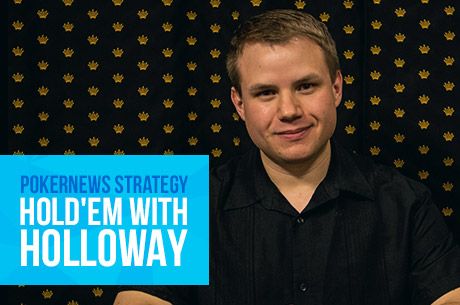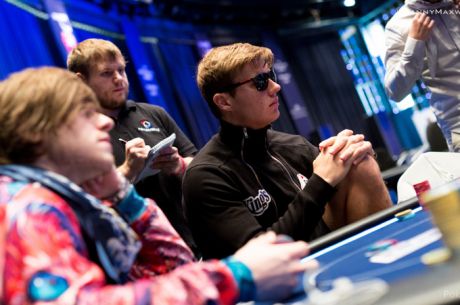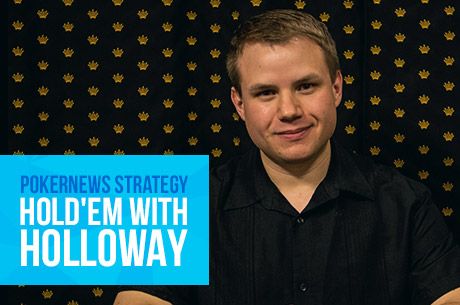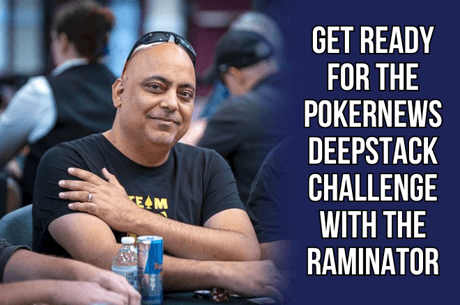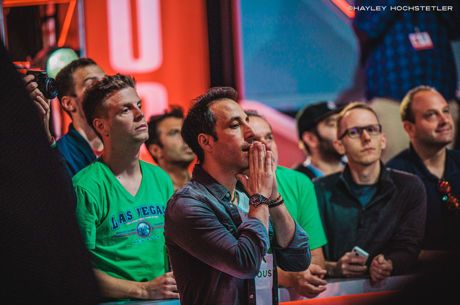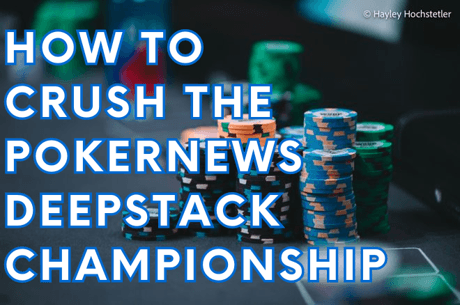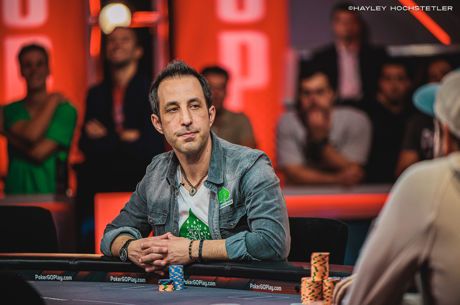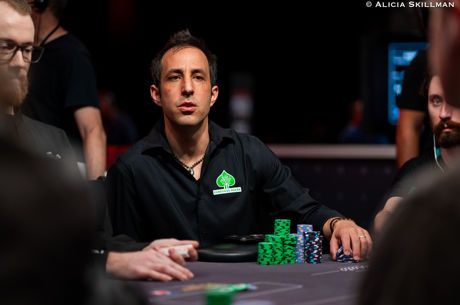Hold’em with Holloway, Vol. 40: Practicing Patience in My Deep PPC Poker Tour Run

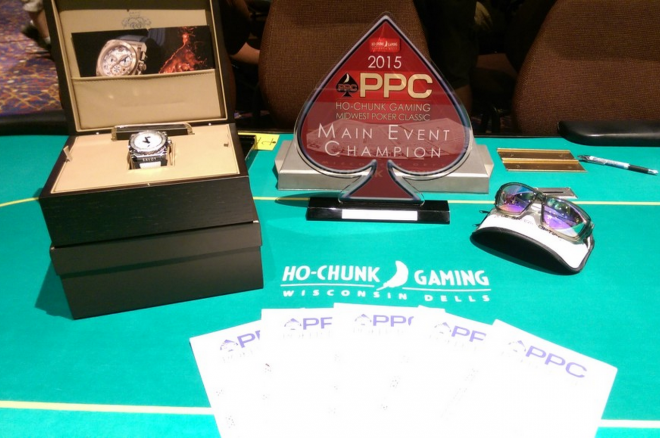
This past weekend I had the opportunity to play in my first-ever PPC Poker Tour Main Event. In all my years of playing poker, I’ve never experienced a more taxing tournament. Every hour seemed like three, and each hand brought with it an overwhelming sense of dread. That’s because I was short-stacked and card dead the majority of Day 2. Even so, I managed to finish in 11th place.
They say patience is a virtue, but what they don’t say is it can also be torturous. The 2015 Midwest Poker Classic Ho-Chunk Gaming $350 Main Event — which crushed its $50,000 guarantee by attracting 333 entrants to create a total prize pool of $85,248 plus $21,312 in PPC Aruba packages — proved that to me.
I grinded a 10-15 big blind stack for most of Day 2. I desperately yearned for a quality hand to play, and the pressure only compounded when time and again I looked down at trash. It was stressful, and it definitely made me miss and appreciate the comfort level that accompanies sitting on a big stack.
In this week’s Hold’em with Holloway I want to focus on the importance of patience. To be fair, it is not one of my strongest qualities; in fact, I tend to mix it up early and often, pressing small edges and playing too many hands. However, after a miserable 2015 World Series of Poker, I decided it was time to try change up my game. It’s still a work in progress, but here are two changes I made for the PPC Main Event that I feel helped me make a deep run.
I Actively Avoided Playing Weak Aces
No hands get me in trouble quite like weak aces, by which I mean anything from Ax2x through Ax9x. These hands are prone to causing two outcomes — you’ll either flop an ace and end up losing chips due to your poor kicker, or you’ll pair that low kicker and often lose to an overpair. Of course, there are other scenarios, but those two are quite common.
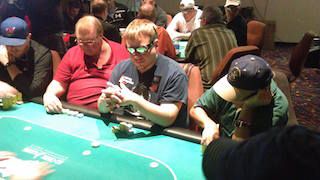
I don’t know why it took so long for me to give up on weak aces — I guess aces just look so pretty — but I simply got tired of losing chips with such hands. As such, I resolved to cut them out of my range unless circumstances were just right (e.g., I get to see a cheap flop from the blinds, it folds to me on the button, etc.). In short, no more playing weak aces from early position or when faced with a raise, regardless of it being suited.
At times tossing away weak aces, especially Ax9x, was tough given how card dead I was, but I feel it worked to my advantage. It allowed me to preserve my stack, which in turn gave me more ammunition when I picked up quality hands.
I don’t know why it took so long for me to give up on weak aces... I simply got tired of losing chips with such hands.
I know many experienced players out there are thinking, “Of course you shouldn’t play them — this is elementary school stuff.” True, but I see an awful lot of people losing an awful lot of chips playing weak aces. I hope they continue to do so, but I’ve finally wised up.
Always Be Aware of the Value of My Chips
During the 2015 WSOP, Rep Porter wrote a four-part series for ThePokerAcademy.com that centered on “Accumulating Chips vs. Survival.” I actually took a lot from these articles, most notably what Porter has to say about recognizing the value of your chips at different points in the tournament.
For instance, on the PPC money bubble I was certainly one of the shorter stacks in play, but I wasn’t in a tremendous amount of trouble (I had my standard 10-15 big blinds). That meant I wasn’t about to three-bet a mediocre hand like AxJx, nor shove with questionable hands such as those aforementioned weak aces, small pocket pairs, or the like.
Likewise, when we made the money I knew holding onto my chips was more important than accumulating chips, a philosophy that allowed me to ladder up considerably. I definitely wasn’t calling shoves light.
It’s hard for me to explain Porter’s points properly as I’m still in the process of incorporating them into my tournament thought process. That said, I highly recommend you go back and read the four-part series for yourself.
Here are some quick links to each:
- ThePokerAcademy.com Presents Accumulating Chips vs. Survival Part I
- ThePokerAcademy.com Presents Accumulating Chips vs. Survival Part II
- ThePokerAcademy.com Presents Accumulating Chips vs. Survival Part III
- ThePokerAcademy.com Presents Accumulating Chips vs. Survival Part IV
Congrats to My Cousin Dan Almerli
Speaking of the PPC Poker Tour, I also want to take a moment and congratulate my cousin Dan Almerli, who took down Event #3: $175 No-Limit Hold’em Bounty in the 2015 Midwest Poker Classic Ho-Chunk Gaming series, a tournament that attracted 86 entrants.
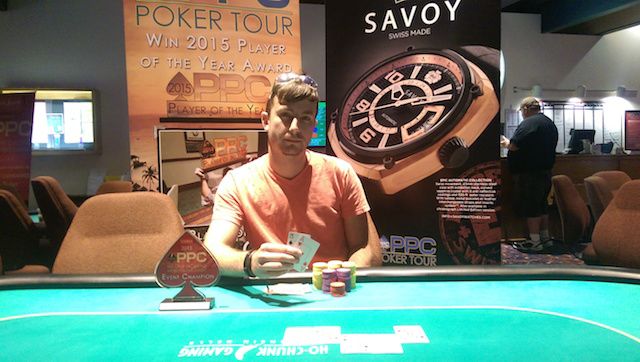
For the win, Almerli took home the $1,959 first-place prize, $750 in bounties, and a $1,660 PPC Aruba World Championship package consisting of a $300 buy-in to Event #1, a $100 buy-in to Event #9, a three-night stay at the host Hilton Aruba Resort, and $360 airfare credit. If all goes according to plan, I’ll be joining him in Aruba come November!
Want to stay atop all the latest in the poker world? If so, make sure to get PokerNews updates on your social media outlets. Follow us on Twitter and find us on both Facebook and Google+!

PR & Media Manager for PokerNews, Podcast host & 2013 WSOP Bracelet Winner.
In this Series
- 1 Hold’em with Holloway, Vol. 1: Making Reads and Trusting Them
- 2 Hold’em with Holloway, Vol. 2: Playing in Poker Charity Events
- 3 Hold’em with Holloway, Vol. 3: Throttle Back Before You End Up Punting
- 4 Hold’em with Holloway, Vol. 4: Punish the Satellite Bubble
- 5 Hold’em with Holloway, Vol. 5: What is Proper Accumulator Strategy?
- 6 Hold’em with Holloway, Vol. 6: A Chip and a Chair Story with “SirWatts”
- 7 Hold’em with Holloway, Vol. 7: 15 Things About Poker I Wish I’d Known Sooner
- 8 Hold’em with Holloway, Vol. 8: Examining the Largest Overlay in Poker History
- 9 Hold’em with Holloway, Vol. 9: Differences Between Rebuys and Reentries
- 10 Hold’em with Holloway, Vol. 10: Five Must-Read Poker Books of 2014
- 11 Hold’em with Holloway, Vol. 11: When Will You Finally Break Through?
- 12 Hold’em with Holloway, Vol. 12: Dealing with a Target on Your Back
- 13 Hold’em with Holloway, Vol. 13: Knowing When to Call It Quits
- 14 Hold’em with Holloway, Vol. 14: Embarking on a Year-Long Weight Loss Journey
- 15 Hold’em with Holloway, Vol. 15: Navigating Multiple Decision Points in a Poker Hand
- 16 Hold’em with Holloway, Vol. 16: Chris Moorman Tells Me How Badly I Play Poker
- 17 Hold’em with Holloway, Vol. 17: Richard “nutsinho” Lyndaker on Getting It in Marginal
- 18 Hold’em with Holloway, Vol. 18: Getting Inside the Head of Poker Pro Brian Rast
- 19 Hold’em with Holloway, Vol. 19: Stupid Calls & Lucky Draws in MSPT WI Championship
- 20 Hold’em with Holloway, Vol. 20: Talking Ante-Only Strategy with Greg “FossilMan” Raymer
- 21 Hold’em with Holloway, Vol. 21: Contributing to Jonathan Little’s New Book
- 22 Hold’em with Holloway, Vol. 22: Consequences of Acting Out of Turn & Tossing in Chips
- 23 Hold’em with Holloway, Vol. 23: When It Comes to Chops, Do What’s In Your Best Interest
- 24 Hold’em with Holloway, Vol. 24: Accepting Bad Beats & Lessons in Selling Action
- 25 Hold’em with Holloway, Vol. 25: Heinz’ Ace-High Call Shows Why He's a World Champ
- 26 Hold’em with Holloway, Vol. 26: Is Keeping the Short Stack Alive Collusion?
- 27 Hold’em with Holloway, Vol. 27: Great Laydown or Bad Fold on Poker Night in America?
- 28 Hold’em with Holloway, Vol. 28: Calling Hellmuth with Jack-Deuce Offsuit
- 29 Hold’em with Holloway, Vol. 29: The Philosophy of "No-Chop" Chad
- 30 Hold’em with Holloway, Vol. 30: Preparing to Play the World Series of Poker
- 31 Hold’em with Holloway, Vol. 31: Staying on Your Grind at the World Series of Poker
- 32 Hold’em with Holloway, Vol. 32: The Perilous Decision to Call Off with Ace-Queen
- 33 Hold’em with Holloway, Vol. 33: Using Poker Skills in Reality TV Competitions
- 34 Hold’em with Holloway, Vol. 34: Esfandiari Explains How to Recover from Bad Beats
- 35 Hold’em with Holloway, Vol. 35: Tilly vs. Brunson in Super High Roller Cash Game Hand
- 36 Hold’em with Holloway, Vol 36: Unconventional Play Leads to Good WSOP Main Event Start
- 37 Hold’em with Holloway, Vol. 37: Lessons in Pot-Limit Omaha Hi-Low w/ Evan Jarvis
- 38 Hold’em with Holloway, Vol. 38: Things to Say and Do When You Bust a Poker Tournament
- 39 Hold’em with Holloway, Vol. 39: How Much Did I Have to Raise to Get You to Fold?
- 40 Hold’em with Holloway, Vol. 40: Practicing Patience in My Deep PPC Poker Tour Run
- 41 Hold’em with Holloway, Vol. 41: Analyzing a Questionable SHRPO Main Event Hand
- 42 Hold’em with Holloway, Vol. 42: Analyzing the Play of Neymar Jr. at EPT Barcelona
- 43 Hold’em with Holloway, Vol. 43: The Value of a Reliable Poker Reputation
- 44 Hold’em with Holloway, Vol. 44: John “KasinoKrime” Beauprez Rips My PLO Game Apart
- 45 Hold’em with Holloway, Vol. 45: Satellite Dilemmas -- To Call or Not to Call
- 46 Hold’em with Holloway, Vol. 46: Seiver Leverages the River in Super High Roller Bowl
- 47 Hold’em with Holloway, Vol. 47: What Untraditional Moves in Poker Might Mean
- 48 Hold’em with Holloway, Vol. 48: Thinking About the Future with Sam Grizzle
- 49 Hold’em with Holloway, Vol. 49: WCOOP Champ “Coenaldinho7” Offers Up His Biggest Hands
- 50 Hold’em with Holloway, Vol. 50: The Peril of Shoving Weak Aces
- 51 Hold’em with Holloway, Vol. 51: The Importance of Not Giving Up in Poker Tournaments
- 52 Hold’em with Holloway, Vol. 52: Does Asking “Check” Actually Constitute a Check?
- 53 Hold’em with Holloway, Vol. 53: Thomas Cannuli Impresses Even After Main Event Bustout
- 54 Hold’em with Holloway, Vol. 54: Dealers Aren’t Always Right
- 55 Hold’em with Holloway, Vol. 55: Don’t Get Married to Pocket Aces
- 56 Hold’em with Holloway, Vol. 56: Bazeley’s Survival Instinct Leads to Continued Success
- 57 Hold’em with Holloway, Vol. 57: Playing “Deuces Wild” on the European Poker Tour
- 58 Hold’em with Holloway, Vol. 58: The Wildest Hand in European Poker Tour History
- 59 Hold’em with Holloway, Vol. 59: Death, Zombies & Spending Time w/Phil Hellmuth
- 60 Hold’em with Holloway, Vol. 60: How the Unstoppable Fedor Holz Managed to Win Again
- 61 Hold’em with Holloway, Vol. 61: Lessons To Be Learned When You Hit the Big Stage
- 62 Hold’em with Holloway, Vol. 62: Steve O’Dwyer Explains the “Oreo Cookie Tell”
- 63 Hold’em with Holloway, Vol. 63: What Would Happen to a Chip Stack If a November Niner Died?
- 64 Hold’em with Holloway, Vol. 64: Forgetting One Chip -- Should It Still Be an All-In Bet?
- 65 Hold’em with Holloway, Vol. 65: Todd “sharkslayerrr” Breyfogle on Bankroll Management
- 66 Hold’em with Holloway, Vol. 66: Cash Game Pro Daniel Arfin Offers Sound Bankroll Advice
- 67 Hold’em with Holloway, Vol. 67: Honeyman Plays Kings to Keep in Opponent’s Bluff Range
- 68 Hold’em with Holloway, Vol. 68: Why Do I Even Bother Drinking at the Poker Table?
- 69 Hold’em with Holloway, Vol. 69: Is Your Favorite Poker Pro Left- or Right-Handed?
- 70 Hold’em with Holloway, Vol. 70: In Order to Live You Have to Be Willing to Die
- 71 Hold’em with Holloway, Vol. 71: How to Amass a Big Stack Early in a Poker Tournament
- 72 Hold’em with Holloway, Vol. 72: Answering User-Submitted Poker Scenarios
- 73 Hold’em with Holloway, Vol. 73: Saying Goodbye with a Top Five List
- 74 Hold'em with Holloway, Vol. 74: We're Back, Baby!
- 75 Hold'em with Holloway, Vol. 75: Jivkov on Exploiting Capped Ranges
- 76 Hold’em with Holloway, Vol. 76: Matt Bretzfield Gets Tricky With Aces
- 77 Hold'em with Holloway, Vol. 77: Joseph Cheong Gets Crazy with a Pair of Ladies
- 78 Hold'em with Holloway, Vol. 78: Wyoming Poker Action & Wild South Dakota Hand
- 79 Hold'em with Holloway, Vol. 79: Calling Controversy at WinStar
- 80 Hold'em with Holloway, Vol. 80: Going for Value with Matt Hunt
- 81 Hold'em with Holloway, Vol. 81: Bracelet Winner Ryan Leng on Bad Call
- 82 Hold'em with Holloway, Vol. 82: Romeopro33 Recounts XL Eclipse Victory
- 83 Hold'em with Holloway, Vol. 83: Men The Master Doesn't Get Paid
- 84 Hold'em with Holloway, Vol. 84: Harman Hits Back-to-Back Miracle Turns
- 85 Hold'em with Holloway, Vol. 85: Jamie Kerstetter on Dealing with Bounties
- 86 Hold'em with Holloway, Vol. 86: Matt Stout Develops a Limp Dynamic
- 87 Hold'em with Holloway, Vol. 87: Matt Alexander Caught in Between w/ Two Red Aces
- 88 Hold'em with Holloway, Vol. 88: John Beauprez on Why He Folded a Set of Jacks
- 89 Hold'em with Holloway, Vol. 89: Alex Aqel Lets Opponent Hang Himself with Aces
- 90 Hold'em with Holloway, Vol. 90: David Peters Makes Beastly Call Against Will Givens
- 91 Hold'em with Holloway, Vol. 91: Poker Lessons from a Game of Risk
- 92 Hold'em with Holloway, Vol. 92: My Upstuck Diagnosis by the CLC Squad
- 93 Hold'em with Holloway, Vol. 93: Alex Foxen Coolers Nick Petrangelo in SHRB
- 94 Hold'em with Holloway, Vol. 94: My $25,000 PSPC Experience at 2019 PCA
- 95 Hold'em with Holloway, Vol. 95: The Equity of Leveraging Time Extensions
- 96 Hold'em with Holloway, Vol. 96: Dan O'Brien on Developing Healthy Routines
- 97 Hold'em with Holloway, Vol. 97: Big Hands From the WSOP-C Potawatomi
- 98 Hold'em with Holloway, Vol. 98: Simon Deadman Rips Apart My NLH Tourney Play
- 99 Hold'em with Holloway, Vol. 99: Shoving 10-6 Smack Dab Into Pocket Aces
- 100 Hold'em with Holloway, Vol. 100: The Revived Re-Entries Debate
